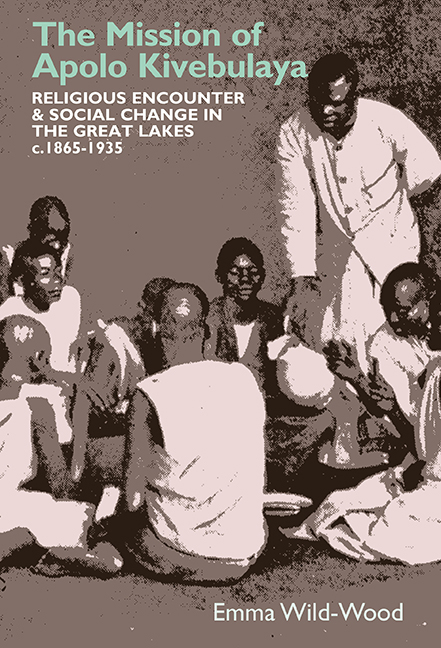Book contents
- Frontmatter
- Dedication
- Contents
- List of Maps and Photographs
- Acknowledgements
- Note on Orthography and Glossary
- Timeline
- Introduction: Kivebulaya and religious change in the Great Lakes
- 1 The afterlife of Saint Canon Apolo (1933 onwards)
- 2 Waswa, a commoner in the Kingdom of Buganda (c.1865–c.1884)
- 3 Munubi, a foot soldier in battle and evangelism (c.1884–1895)
- 4 Itinerant teacher ‘from Europe’ in Toro (1895–1905)
- 5 Clerk in holy orders (1905–1915)
- 6 To all Ituri nations under Belgian rule (1915–1925)
- 7 Reverend Canon Apolo, elder and churchman (1925–1933)
- Conclusion: African missionaries, religious encounter and social change 270
- Sources
- Index
- EASTERN AFRICAN STUDIES
1 - The afterlife of Saint Canon Apolo (1933 onwards)
Published online by Cambridge University Press: 30 April 2020
- Frontmatter
- Dedication
- Contents
- List of Maps and Photographs
- Acknowledgements
- Note on Orthography and Glossary
- Timeline
- Introduction: Kivebulaya and religious change in the Great Lakes
- 1 The afterlife of Saint Canon Apolo (1933 onwards)
- 2 Waswa, a commoner in the Kingdom of Buganda (c.1865–c.1884)
- 3 Munubi, a foot soldier in battle and evangelism (c.1884–1895)
- 4 Itinerant teacher ‘from Europe’ in Toro (1895–1905)
- 5 Clerk in holy orders (1905–1915)
- 6 To all Ituri nations under Belgian rule (1915–1925)
- 7 Reverend Canon Apolo, elder and churchman (1925–1933)
- Conclusion: African missionaries, religious encounter and social change 270
- Sources
- Index
- EASTERN AFRICAN STUDIES
Summary
Kivebulaya is dead!
Our hero has fallen!
Our Canon is asleep;
Our Lord has called him.
Hallelujah, let's sing for him,
Let's build a monument for him;
Which is the work of you, Muganda,
To the poor, to the rich.
His garden is his teaching to the world.
From ‘The Service of Apolo Kivebulaya’ by S. M. K. L. Mukasa.Introduction
Canon Apolo Kivebulaya lived and died in the ‘hope of the resurrection of the dead and the life of the world to come’, as he proclaimed in the Nicene Creed each time he took communion. He also had an afterlife in the recollections of his followers and admirers who commemorated his tenacious dissemination of the message of eternal life through Jesus Christ. An analysis of Kivebulaya's life begins with this chapter-length discussion of his memorialisation because it is an inescapable part of his history, and it influences the sources used in the following chapters to reconstruct his life and times. The chapter informs a much larger scholarly debate about the generation of memory and the myth-making of admired individuals and groups that is seen most prominently in the region in the veneration of the Uganda martyrs. Through the examination of the constituencies and the tools of memory construction the chapter reveals a history of difference, of common values and collective identity creation within Christianity in the Great Lakes region and internationally.
Kivebulaya lived on in the plays, songs, stories and poems like the one above, whose eighteen stanzas were printed in the periodical Ebifa mu Buganda, three months after his death. Churches and schools are dedicated to ‘Canon Apolo’ or ‘Saint Apolo’ in Congo and Uganda. Their signs are visible on main roads. He appears in stained glass windows in Uganda and Kenya, and on commemorative stamps in Kenya and Tanzania. In Ugandan school textbooks for Religious Studies from primary school through to A level he is the pre-eminent example of African leadership and African mission. Since Uganda has an impressive array of historical Christian figures it is notable that in the textbooks Kivebulaya is mentioned more often than any other individual or group, including the Uganda martyrs, who elsewhere in society have a high profile.
- Type
- Chapter
- Information
- The Mission of Apolo KivebulayaReligious Encounter & Social Change in the Great Lakes c. 1865–1935, pp. 35 - 60Publisher: Boydell & BrewerPrint publication year: 2020

